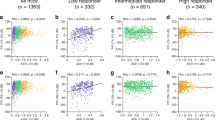Abstract
Acoustic prepulse inhibition (PPI) refers to the reduction of the startle reflex to an intense stimulus if it is preceded by a weak stimulus. Nicotine and smoking have been reported to enhance PPI in rats and in healthy men, respectively. We studied the influence of smoking on PPI in healthy men and women, comparing non-smokers, deprived smokers, and smokers smoking during the test session after deprivation or after ad libitum smoking. Smoking during the session enhanced PPI, without affecting startle reaction or habituation over time. In addition, the effect of smoking on PPI was gender dependent. In men, ad libitum smoking enhanced PPI compared with non-smokers, while, in women, deprivation reduced PPI and smoking restored PPI to the level of non-smokers.
Similar content being viewed by others
Author information
Authors and Affiliations
Additional information
Received: 24 July 1997/Final version: 19 November 1997
Rights and permissions
About this article
Cite this article
Della Casa, V., Höfer, I., Weiner, I. et al. The effects of smoking on acoustic prepulse inhibition in healthy men and women. Psychopharmacology 137, 362–368 (1998). https://doi.org/10.1007/s002130050631
Issue Date:
DOI: https://doi.org/10.1007/s002130050631




